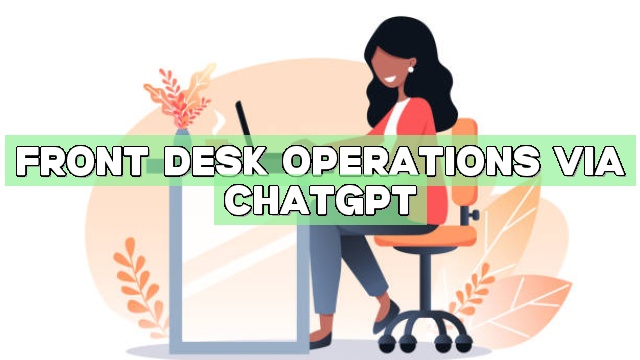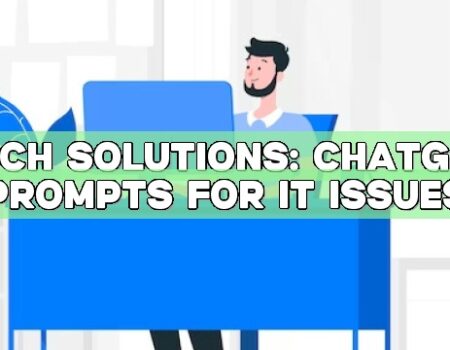As the world becomes increasingly digital, more businesses are looking for ways to streamline their operations and improve productivity. One area where this is particularly important is at the front desk, where receptionists are responsible for managing a wide range of tasks on a daily basis. To address this challenge, many companies are turning to ChatGPT prompts to assist their receptionists in performing their duties more efficiently.
Key Takeaways
- ChatGPT can be used to improve front desk operations and enhance workforce productivity
Understanding Receptionist Duties
Receptionists are the face of any organization, as they are often the first point of contact for clients, visitors and callers. These professionals are responsible for a wide range of duties, which include:
- Greeting visitors and directing them to the appropriate person or department
- Answering phone calls and emails and forwarding them to the right recipient
- Scheduling appointments and managing calendars
- Managing administrative tasks such as data entry, filing, and maintaining records
- Handling inquiries, complaints, and resolving customer issues
In addition to these tasks, receptionists must also remain professional and courteous at all times, ensuring that visitors and callers feel welcome and attended to.
Front desk responsibilities can be a lot of work for one person, especially during peak hours. However, with the help of technology, such as artificial intelligence, receptionists can streamline their duties and improve their efficiency, ultimately enhancing their productivity.
Introducing ChatGPT
In recent years, the field of artificial intelligence has made significant advancements, providing new ways to improve productivity and efficiency in various industries. One of the most exciting developments in this field is the emergence of language models like ChatGPT.
ChatGPT is an artificial intelligence language model developed by OpenAI. It uses machine learning algorithms to generate human-like responses to natural language input.
ChatGPT is unique because it has been trained on a massive dataset of human language and can generate coherent responses to a wide range of queries. This makes it a valuable tool for businesses and individuals looking to improve communication and automate repetitive tasks.
ChatGPT’s capabilities have already been leveraged in various fields, including customer service and personal assistants. In the context of front desk operations, ChatGPT can assist receptionists in performing their duties effectively and efficiently.
Leveraging ChatGPT for Receptionist Duties
As mentioned earlier, ChatGPT’s artificial intelligence capabilities can improve front desk operations by assisting receptionists in their duties. By using ChatGPT prompts, receptionists can streamline tasks, reduce human error, and improve efficiency.
For example, ChatGPT can assist in answering phone calls by providing suggested responses for frequently asked questions. This can save time and ensure consistency in communication with callers. Additionally, ChatGPT can handle inquiries by processing the information provided and generating appropriate responses.
Another area of receptionist duties that can benefit from ChatGPT is managing appointments. ChatGPT can provide suggested appointment times based on availability and schedule appointments by sending confirmation messages to both the receptionist and the client.
ChatGPT Prompts for Receptionist Duties
With ChatGPT’s capabilities in mind, here are some example prompts that receptionists can use in their daily tasks:
| Prompt | ChatGPT Response |
|---|---|
| Can you provide me with information about the company’s products? | Of course! Our company offers a wide range of products, including [product 1], [product 2], and [product 3]. Which one are you interested in learning more about? |
| Can you schedule an appointment for me with Dr. Johnson? | Yes, I can certainly do that. Our next available appointment with Dr. Johnson is on 2025 at [time]. Would that work for you? |
| What are the company’s hours of operation? | Our company is open from [time] to [time] Monday through Friday. We are closed on weekends and major holidays. |
By using ChatGPT prompts like these, receptionists can manage their workload more efficiently and provide better customer service to clients.
Example ChatGPT Prompts for Receptionist Duties
Receptionist tasks can be time-consuming and can distract from other important front desk operations. By using ChatGPT prompts, receptionists can quickly and efficiently handle inquiries, appointments, and other front desk tasks. Here are some example prompts:
| Receptionist Task | ChatGPT Prompt | ChatGPT Response |
|---|---|---|
| Answering the phone | ChatGPT, please answer the phone. | Thank you for calling [Company Name]. How may I assist you? |
| Scheduling appointments | ChatGPT, schedule an appointment for [Date] at [Time] with [Client Name]. | Appointment scheduled for [Date] at [Time] with [Client Name]. Is there anything else I can assist you with? |
| Handling inquiries | ChatGPT, please provide information on [Product/Service Name]. | Here is the information on [Product/Service Name]: [Insert Product/Service Information]. Is there anything else you would like to know? |
These are just a few examples of how receptionists can leverage ChatGPT prompts to manage their workload effectively. By using ChatGPT, receptionists can enhance their productivity, streamline front desk operations, and reduce errors.
Enhancing Workforce Productivity with ChatGPT
By leveraging ChatGPT for receptionist duties, front desk management can greatly benefit from improved workforce productivity. The use of ChatGPT prompts can streamline tasks and reduce human error, resulting in a more efficient and effective front desk operation.
With ChatGPT, receptionists can spend less time on routine tasks such as answering phone calls, handling inquiries, and managing appointments, allowing them to focus on more complex and demanding tasks. By shifting these routine tasks to ChatGPT, receptionists can avoid burnout and achieve a higher level of productivity.
Moreover, the use of ChatGPT can also help in managing the workload during peak periods. With ChatGPT, a receptionist can handle more phone calls and inquiries at once, maximizing the team’s efficiency during busy periods.
Overall, the benefits of ChatGPT for front desk management are clear. It can help improve workforce productivity, streamline tasks, and reduce human error. By using ChatGPT to assist in routine tasks, receptionists can focus on more complex and demanding tasks, ultimately enhancing overall productivity.
Managing Complex Tasks with ChatGPT
While ChatGPT can handle many receptionist duties with ease, there may be some complex tasks that require a bit more attention. However, by breaking down these complex tasks into smaller prompts, receptionists can leverage ChatGPT’s abilities to handle detailed information and ensure accuracy in their responses.
For example, managing a client’s schedule for a large event can be overwhelming. By breaking down the task into smaller prompts, such as “What is the client’s preferred location?” or “What time should the event start?” receptionists can input the necessary information into ChatGPT, which can then provide an organized and detailed schedule for the client.
Additionally, ChatGPT can assist with handling multiple tasks at once. For example, if a receptionist needs to manage several client inquiries at once, ChatGPT can prioritize and handle each task accordingly, ensuring that no client is left waiting for too long.
Overall, by using ChatGPT for complex task management, receptionists can streamline their work and ensure efficient and accurate responses to clients.
Maximizing ChatGPT’s Potential
While ChatGPT can greatly improve receptionist productivity, there are steps that can be taken to fully maximize its potential. Here are some tips for using ChatGPT effectively:
- Train the system: ChatGPT is only as good as the data it’s trained on. Take the time to input any necessary information and train the system on specific language or terminology relevant to your industry or company.
- Be specific with prompts: Rather than using general prompts, be specific with the information you provide. This will help ChatGPT give more accurate responses and reduce the likelihood of errors.
- Regularly update prompts: As your business evolves, make sure to update ChatGPT prompts to reflect any changes. This will ensure that the system continues to be a valuable resource for your receptionist duties.
- Monitor system accuracy: Regularly monitor ChatGPT responses to ensure accuracy and address any errors or inconsistencies.
- Provide feedback: ChatGPT can learn from feedback, so be sure to provide feedback on the system’s responses. This will help improve its accuracy over time.
By following these tips, receptionists can fully utilize ChatGPT and streamline front desk operations, ultimately improving overall productivity.
Conclusion
The benefits of ChatGPT in front desk operations cannot be overstated. Through its use, receptionists can streamline tasks, reduce human error, and manage complex inquiries efficiently. The implementation of ChatGPT prompts also ensures that receptionists provide consistent and accurate responses to inquiries. This, in turn, enhances workforce productivity by freeing receptionists to focus on other essential tasks.
As we move towards the future of receptionist duties, automation undoubtedly presents a significant opportunity for businesses to improve their front desk operations. ChatGPT is an exciting innovation that has the potential to revolutionize the industry.
The Future of Front Desk Automation
The use of ChatGPT for receptionist duties represents just the beginning of the potential for front desk automation. As the technology continues to develop, it will be possible to employ increasingly sophisticated chatbots to manage more complex tasks. Future developments in chatbot integration with other technology platforms, such as voice-activated personal assistants, may enable chatbots to manage more complicated tasks, such as scheduling meetings, setting reminders, and conducting financial transactions.
The future of front desk automation will undoubtedly lead to an expansion in the scope of receptionist duties. It will also likely lead to an increase in workforce productivity, efficiency, and accuracy, ultimately benefiting both receptionists and businesses alike.
ChatGPT is just the first wave of innovation in the automation of receptionist duties. With advancements in AI technologies, the future of front desk automation is bright, and exciting possibilities are on the horizon.
FAQ
Q: What is ChatGPT?
A: ChatGPT is an artificial intelligence language model that can assist in performing various tasks through natural language interactions.
Q: How does ChatGPT work?
A: ChatGPT works by generating responses based on the input it receives. It uses a large amount of pre-existing data to understand and generate human-like text.
Q: What are the benefits of using ChatGPT for receptionist duties?
A: Using ChatGPT for receptionist duties can improve front desk operations, enhance workforce productivity, and streamline tasks such as answering phone calls, handling inquiries, and managing appointments.
Q: Can ChatGPT handle complex tasks?
A: Yes, ChatGPT can handle complex tasks by breaking them down into smaller prompts and utilizing its ability to handle detailed information. It can assist receptionists in managing and navigating through complex situations.
Q: How can ChatGPT maximize workforce productivity?
A: By automating certain receptionist duties and streamlining tasks, ChatGPT can help improve efficiency, reduce human error, and increase overall workforce productivity in front desk operations.
Q: Are there any tips for using ChatGPT effectively?
A: Yes, some tips for maximizing the potential of ChatGPT include providing clear and specific prompts, ensuring accuracy by verifying information when necessary, and regularly updating and refining prompts for optimal performance.
Q: What is the future of receptionist duties with ChatGPT?
A: ChatGPT has the potential to revolutionize front desk operations and receptionist duties by automating repetitive tasks, improving efficiency, and enabling receptionists to focus on more complex and valuable interactions with customers and clients.









